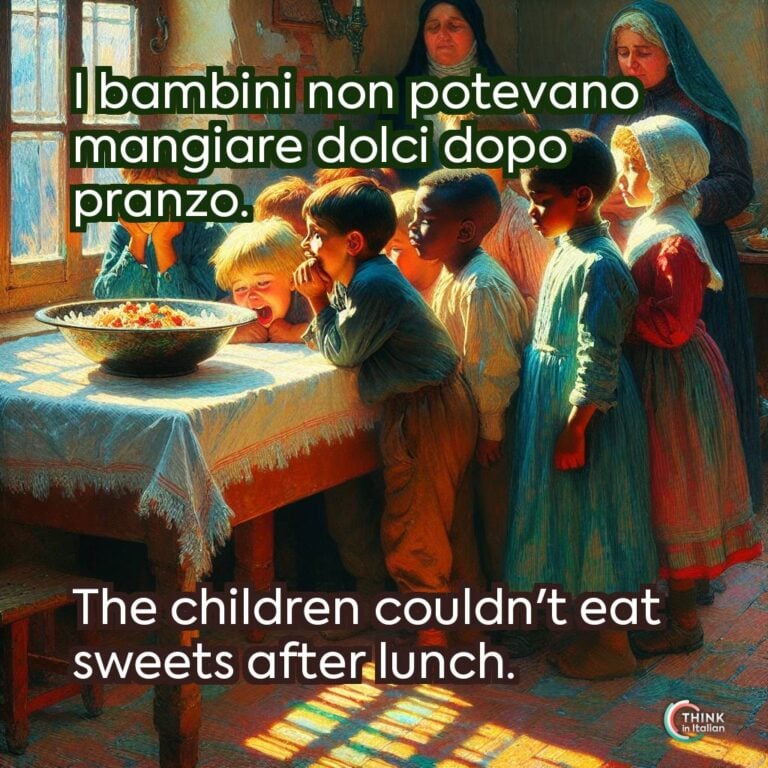What are “Potere”, “Volere”, “Dovere” and “Sapere” in Italian?
Volere (to want), potere (to can/be able to), dovere (to have to), and sapere (to know) are Italian modal verbs. These verbs are irregular verbs that indicate a modality, like probability, ability, obligation, necessity…
Just like in English, Italian modal verbs are always followed by a verb in the infinitive tense.
Voglio mangiare la pizza.
I want to eat pizza.
Possiamo venire con voi?
Can we come with you?
Dovete andare a casa.
You have to go home.
Simona sa sciare molto bene.
Simona can sky very well.
Given their use, they are classified as auxiliary verbs, like essere and avere. For this reason, these verbs can be conjugated in all verb tenses. In this lesson, I will show you the the imperfetto.
Imperfect Tense of “Potere”, “Volere”, “Dovere” and “Sapere”
What is Imperfetto
Imperfetto is one of the tenses that we have in Italian to talk about the past. Specifically, it refers to:
- Continued and prolonged actions that happened in the past
- Habits and repeated actions in the past
- Factual conditions in the past
- Descriptions in the past
La piazza prima era molto piccola.
Before, the square was very small.
Laura non stava molto bene ieri.
Laura wasn’t very well yesterday.
Noi andavamo sempre in Messico d’estate.
We would always go to Mexico in the summer.
Cosa dicevi ieri su mio fratello?
What were you saying yesterday about my brother?
What I always tell my students to make it easier is to translate imperfetto with the English “used to”.
Imperfetto of Modal Verbs
As I mentioned before, modal verbs are generally irregular. However, not all irregular Italian verbs display irregularities in all verbs tenses. In fact, the conjugation of the imperfetto of this verb is actually regular and consistent.
- volere
| Italian | Translation |
| Io volevo | I wanted |
| Tu volevi | You wanted |
| Lui/Lei voleva | He/She wanted |
| Noi volevamo | We wanted |
| Voi volevate | You wanted |
| Loro volevano | They wanted |
La scorsa estate io volevo andare al mare.
Last summer, I wanted to go to the beach.
Cosa volevi dirmi ieri?
What did you want to tell me yesterday?
- potere
| Italian | Translation |
| Io potevo | I could |
| Tu potevi | You could |
| Lui/Lei poteva | He/She could |
| Noi potevamo | We could |
| Voi potevate | You could |
| Loro potevano | They could |
Da piccoli, non potevamo uscire con i nostri amici.
When we were little, we couldn’t go out with our friends.
L’anno scorso potevo lavorare da casa.
Last year, I could work from home.
- dovere
| Italian | Translation |
| Io dovevo | I had to |
| Tu dovevi | You had to |
| Lui/Lei doveva | He/She had to |
| Noi dovevamo | We had to |
| Voi dovevate | You had to |
| Loro dovevano | They had to |
Cosa dovevate dirci ieri?
What did you have to tell us yesterday?
Angelo doveva pulire la casa e non l’ha fatto.
Angelo had to clean the house, but he didn’t do it.
- sapere
| Italian | Translation |
|---|---|
| Io sapevo | I knew |
| Tu sapevi | You knew |
| Lui/Lei sapeva | He/She knew |
| Noi sapevamo | We knew |
| Voi sapevate | You knew |
| Loro sapevano | They knew |
Da bambina non sapevo sciare.
When I was a child I couldn’t ski.
Sapevo giocare a carte, ora non mi ricordo.
I could play cards, now I do not remember.



